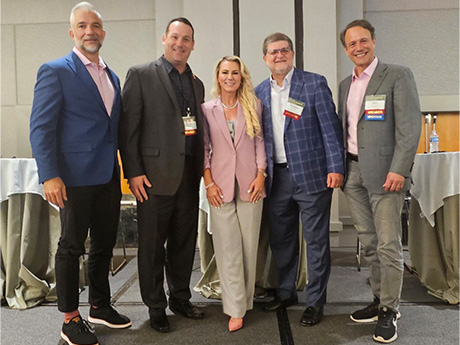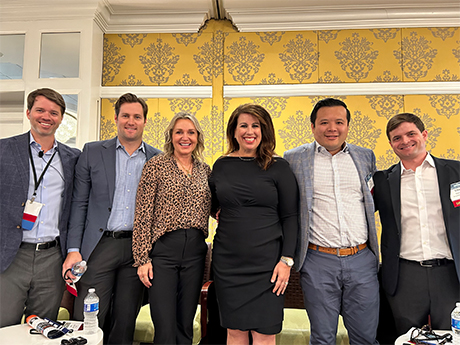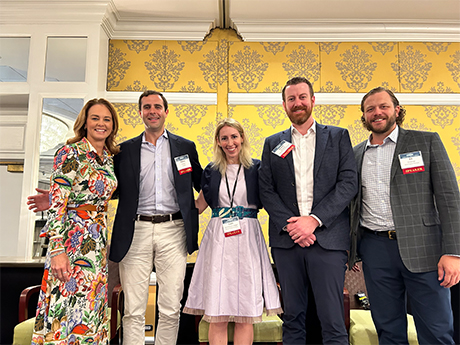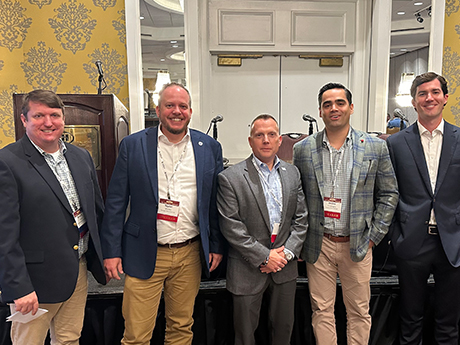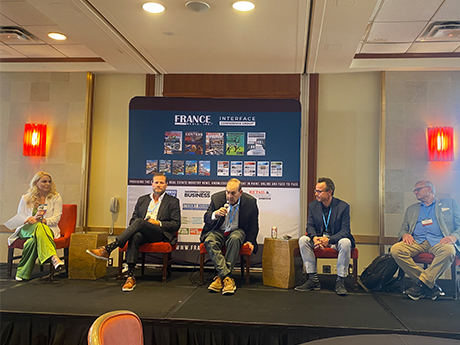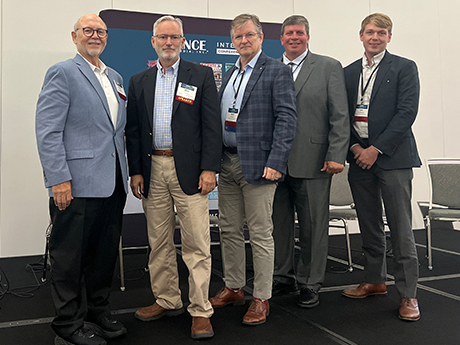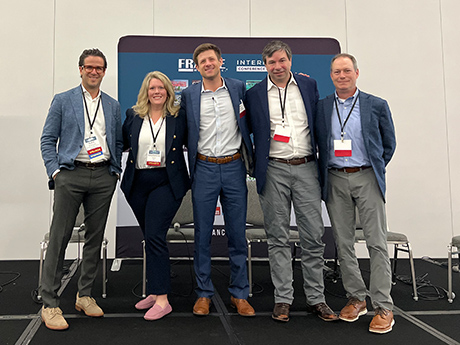By John Nelson Seniors housing is a sector that has a long track record of carefully balancing care for its residents with the fundamentals of real estate, namely the return on investment in the form of monthly rental rates. Equity and debt partners have appreciated the sector as an investment vehicle for decades, but are now fully grasping how important operators are to realizing those gains. This was the topic of discussion among the “power panel” of executives at InterFace Seniors Southeast, an annual conference that was held at Westin Buckhead Atlanta on Wednesday, Aug. 28. Panelists were asked by moderator John Lariccia, CEO and founder of WelcomeHome Software, to summarize the state of the seniors housing industry in a single word. Doug Schiffer, president and chief operating officer of Allegro Senior Living, selected “encouraged” as the best term to describe the current mood of the sector. “The encouragement comes into the fact that both versions of capital, whether it was equity or debt, have actually recognized now the importance of the operator,” said Schiffer. “For quite some time, it was about the importance of the real estate and how the buildings were designed, and then ‘we’ll go find an …
Conference Coverage
Build-to-RentConference CoverageFeaturesMultifamilyNorth CarolinaSingle-Family RentalSouth CarolinaSoutheastSoutheast Feature Archive
Build-to-Rent Sector Remains in a Sweet Spot, Say InterFace Panelists
by John Nelson
CHARLOTTE, N.C. — Build-to-rent (BTR), or purpose-built neighborhoods of single-family rental homes, has been an emerging subsector of the multifamily continuum the past several years. The housing type fills a niche for renters as it offers more living space and privacy than typical apartments, but is more affordable and amenitized than for-sale homes. The BTR sector began its ascent during the early years of the COVID-19 pandemic when a confluence of factors —the rise in work-from-home and hybrid work schedules, an increase in household formation of younger millennials, the desirability of more private space including garages and backyards — led to a sharp increase in demand for single-family rental (SFR) homes. Underpinning the increased demand for BTR living is the unaffordability of homeownership for a large swath of Americans. As of mid-year, home prices are now 47 percent higher than they were in early 2020, according to Harvard’s Joint Center for Housing Studies. Home insurance premiums have also risen aggressively in the recent past — up 21 percent between 2022 and 2023, according to the study. Meanwhile, mortgage payments are increasingly untenable as interest rates have also risen dramatically in recent years. For these reasons, institutional investors are actively participating …
Conference CoverageFeaturesMultifamilyNorth CarolinaSouth CarolinaSoutheastSoutheast Feature Archive
Multifamily Investors Need to Capitalize on ‘Golden Window’ to Buy Below Replacement Cost, Say InterFace Panelists
by John Nelson
The method to buy below replacement cost is a tried-and-true investment strategy among real estate investors that allows them to capitalize on short-term fluctuations in the market in order to lock in long-term value. Grant Russell, director of investments at AvalonBay Communities Inc., said that multifamily investors today are in a “golden window” because they can acquire a Class A property for less than what it costs to develop the same community from the ground-up, all things being held equal. “Deals are trading for higher than yesterday’s costs and below today’s costs; these are win-win transactions,” added Russell. “If a developer capitalized the deal a few years ago then they’re selling for a profit, and the buyer is able to acquire these deals for below today’s costs.” These win-win deals are becoming few and far between in today’s environment of elevated interest rates. While buyers are seeking strong yields in their investments, sellers are seeking profitability, and the middle ground has become narrower as those two motivations don’t overlap as often, especially compared to 24 to 36 months ago when interest rates were at historic lows. “In 2021-2022, properties were trading like commodities to some extent — they were two-year …
By Taylor Williams Within the world of multifamily development, the “amenities arms race” has become a well-documented trend over the past decade, a contest to curate and deliver the most appealing combination of entertainment and wellness features and activities to woo prospective renters. In many instances, this approach was successful, and developers succeeded in capturing the hearts and wallets of renters who sought an “everything under one roof” approach to renting. The fervent movement to deliver more extensive and impressive amenity packages also worked for much of the last decade because interest rates were dirt cheap, even though costs of materials and labor needed to install these features were perpetually on the rise. But today’s market is different. Developers not only face stubbornly high construction costs, but also significantly higher interest rates. Spreads on construction loans in particular tend to be higher than on permanent loans simply because this phase of the project life cycle carries the most risk. Unlike with other asset classes such as retail and industrial, where preleasing is often a prerequisite to securing construction debt, it’s exceedingly rare for renters to commit to units that are still two-plus years away from being delivered. The absence of …
Inland Ports Serve As Vital Link in Supply Chain for Industrial Users, Say InterFace Panelists
by John Nelson
CHARLOTTE, N.C. — Inland ports are a growing transportation option in the national supply chain. These facilities provide users — including automotive suppliers, retailers, manufacturers and agricultural producers — an option to import and export their wares to seaports via shipping containers by rail as opposed to trucking their products directly to a port terminal. One of the more prominent inland ports in the country is Inland Port Greer in Upstate South Carolina. The facility’s anchor client is BMW, which operates its mega manufacturing campus in nearby Spartanburg, S.C. Class I freight railroad operator Norfolk Southern Corp. provides rail services from the inland port to the Port of Charleston. Brian Gwin, senior industrial development manager for Norfolk Southern, said that when the railroad operator and the South Carolina Ports Authority (SCPA) established Inland Port Greer in 2013, it was apparent almost immediately that they had a behemoth on their hands. “We knew it was going to be mostly BMW, but we designed Inland Port Greer for 50,000 lifts a year,” said Gwin, referring to the number of shipping containers moved on or off Norfolk Southern trains at the inland port. According to multiple media outlets, the inland port exceeded 100,000 …
By Taylor Williams Industry professionals who hail from and work in San Antonio often describe the city’s economy and real estate scene as steady and healthy in a sort of unspectacular way. Rarely does any commercial sector in San Antonio achieve the high highs and low lows of gateway coastal markets. Further, the market’s quiet consistency has come to stand out as its neighbor up the road, Austin, has exploded as a tech hub in the past decade, bringing with it fervent building booms that still can’t put a dent in the skyrocketing cost of living. Yet this same quality that in years past caused major retailers and restaurants — and investors — to pass on San Antonio is now a primary force that attracts them to the Alamo City, at least according to some local industry experts. Some of these individuals elaborated on the trend at the inaugural InterFace San Antonio retail conference, which took place on April 4 at the Hilton Palacio Del Rio hotel. Bethany Babcock, principal and co-owner of full-service firm Foresite Commercial Real Estate, was the first industry expert who addressed the market’s evolution in the post-COVID era. “We noticed at the last couple trade …
Industrial Investors Are More Selective in Wake of Rising Interest Rates, Say InterFace Panelists
by John Nelson
CHARLOTTE, N.C. — Despite strong fundamentals and a plethora of buyers waiting to transact, the industrial sector is experiencing dwindling sales as the industry is still reeling from the impact of rising interest rates. The U.S. industrial sector recorded $82 billion in sales volume in 2023, a 46 percent year-over-year decline and the lowest sales volume in about six years, according to data from Matthews Real Estate Investment Services. Newmark tallies the first three months of the year totaling $16.9 billion in U.S. industrial sales volume, which would be the seventh consecutive quarter of annualized declines. Michael Brennan, co-founder, chairman and managing principal of Brennan Investment Group, said that the rising cost of debt inherently makes values a moving target even in a healthy sector like industrial real estate, especially with such a massive upswing in interest rates over a short time frame. “Interest rates are the No. 1 problem for real estate,” said Brennan. “Buyers and sellers can’t see eye to eye. And make no mistake, prices went down, though maybe not as much as we thought they would have.” The data backs Brennan up as the average price per square foot was recorded at $130 at the end …
By Taylor Williams The multifamily markets of Austin and San Antonio — two of the fastest-growing cities in the country over the last decade — are on pace to deliver above-average volumes of new apartments in 2024, causing some industry experts to express concerns of potential oversupply. The origins of oversupply are not hard to trace, assuming the average apartment project in those markets takes about four years to complete from the time the site is identified and the entitlement and permitting processes begin to when the property is stabilized. Call it five years for some projects that experienced delays due to COVID-19. But in either case, the current wave of new product was largely financed at historically low interest rates at a time when healthy rent growth was easily underwritten. Demand was there, so developers supplied. And for similar reasons, the distress should be short-lived. With interest rates having risen by 400-plus basis points over the last two years and cuts for 2024 looking increasingly less likely, 2025 should be a year of very few new construction starts. Many owners that are delivering product this year will want to allow time for excess supply to be absorbed and see …
Construction Experts Emphasize Teamwork as Key to Meeting Affordable Housing Building Standards
by Jeff Shaw
ATLANTA — In order to satisfy long-term affordability commitments, builders and designers of affordable housing must be well educated about the sector’s exacting design and construction rules, which are typically driven by the source of a project’s funding. A panel of construction experts speaking at the InterFace Affordable Housing Southeast conference held Thursday, May 9 at Cobb Galleria Centre shared insights about how their industry is meeting these standards today. The inaugural conference hosted by France Media’s InterFace Conference Group and Southeast Multifamily & Affordable Housing Business drew approximately 170 industry professionals. Energy efficiency, teamwork and accessibility were three themes running through the discussion. Accessibility in multifamily construction refers to features that enable people with disabilities or limited mobility to navigate common areas and individual units comfortably and safely. Many of these building features are required by various laws. “Get your consultants, architects and contractors to help you put the deal together,” advised Ross Haynes, chief executive officer of Roswell, Georgia-based Community Construction Group. The company focuses on construction and renovation of affordable housing projects. “That team is there to understand the code requirements that affect the job, including energy programs and accessibility,” added Haynes. Specific energy-efficiency requirements for affordable housing vary. …
AcquisitionsAffordable HousingConference CoverageFeaturesGeorgiaMultifamilySoutheastSoutheast Feature Archive
Volatility Disrupts Investment Sales Activity in Affordable Housing Market, Says InterFace Panel
by John Nelson
ATLANTA — The investment sales market for the affordable housing sector remains muted for one overarching reason: volatility. Cory Sams, executive managing director of GREA (Global Real Estate Advisors), said that a lack of certainty, especially in the capital markets, is giving buyers and sellers of affordable housing properties pause. “The worst thing for a deal is [interest rates] constantly moving around,” she said. “When they were running up and down, every deal fell apart.” Doug Childers, senior managing director of JLL, estimated that affordable housing transaction volume fell 40 percent in 2023 compared with the prior year. For context, multifamily investment sales overall declined by 61 percent year-over-year in 2023, according to MSCI Real Assets (formerly Real Capital Analytics). Childers and Sams made their comments during the investment sales panel of Interface Affordable Housing Southeast, an information and networking conference held at the Cobb Galleria Centre in Atlanta on Thursday, May 9. Interface Conference Group and Southeast Multifamily & Affordable Housing Business hosted the event, which drew approximately 170 industry professionals from across the region. Brian Flanagan, regional director of RBC Community Investments, moderated the investment sales panel. Fittingly, Flanagan kicked off the investment sales discussion by asking the …


